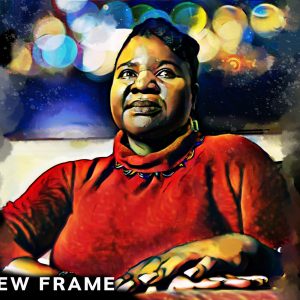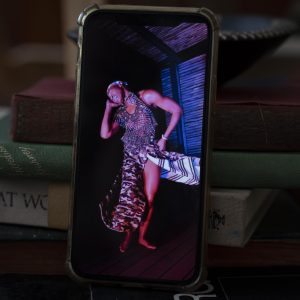Bringing home the message of art as labour
The closure of the Fugard Theatre in Cape Town has left many despondent, but some argue that alongside the other Covid-19 shocks, it will force artists to see themselves for what they are.
Author:
8 April 2021

History is in the Fugard Theatre’s mottled stone walls, lustrous stained-glass windows and imposing metal door. These features tell the story of the space’s origins as a church and then a textile warehouse frequented by tailors and seamstresses in District Six, Cape Town. When the theatre opened in 2010, it was named in honour of pioneering playwright Athol Fugard and steeped in the legacy of stirring anti-apartheid theatre.
“The announcement of the opening of the Fugard Theatre, on the remarkable backing of founding producer Eric Abraham, was a shot in the arm for the South African cultural scene,” says former managing director Daniel Galloway.
“At the opening of the theatre, Athol Fugard spoke slowly and clearly, suggesting that all the guests who were in attendance were sitting on the laps of ghosts. These ghosts required recognition and absolute championing. The Fugard Theatre, Eric Abraham and every single person who ever worked there or visited the theatre played their part.”

The Fugard staged many significant works, including Master Harold and the Boys, District Six: The Musical, John Kani’s Kunene and the King, West Side Story, King Kong and Waiting for Godot.
Musical director and performer Sipumzo Lucwaba remembers the thrill of “watching District Six being watched by people who’d lived through District Six [forced removals] in District Six”. He sighs at this recollection, saddened by the recent news that the theatre has been closed owing to financial pressures brought on by the Covid-19 pandemic.
While some forms of theatre are regarded as elitist, the art form also has a reputation of having been a vehicle of anti-apartheid resistance in South Africa and protest across the world. In apartheid South Africa, workshop theatre arose in clandestine spaces as one of the forms that engaged its progressive potential. It was stripped of the frills of traditional theatre, with iterations upon iterations of dissent staged simply through voice and body.
In India’s struggle for freedom from colonialism, satirical plays depicted British injustice through mythological themes and covert suggestions to avoid prosecution. And in Brazil, Augusto Boal’s Theatre of the Oppressed, which gained prominence in the highly politicised climate of the 1970s, allowed spectators to imagine new worlds, potential solutions to sites of struggle and different realities. These techniques are still used today by teachers, social workers, therapists and activists all over the world.

Lure of theatre
Theatre can be pure escapism, but it can also be deeply political. Often, at its best, it is both. There’s intimacy in an audience communally experiencing a unique performance that can never be precisely replicated. As it did during apartheid, today the art form still brings our history, our struggles and our present to life, providing ways to engage with our stories that allow for imaginative risk-taking, innovation and the questioning of our realities.
“So many came back with their grandparents,” Lucwaba says of District Six’s run at The Fugard. The play sparked an intergenerational dialogue and memory, making “the legendary fresh today”.
There are many different kinds of theatre spaces, and access remains an important question. “Being a South African artist, it feels like that we don’t get to spend a lot of time in ‘fancy’ theatres, for lack of a better word,” says actor, writer and theatre activist Buhle Ngaba.
And this, according to Mandisi Sindo, actor, director and founder of the Khayelitsha Art School and Rehabilitation Centre, is where The Fugard often stepped in. “I worked with The Fugard to bring thousands of artists from the townships to watch King Kong, Kunene and the King and others. The theatre was paying for transport and tickets,” he says.
Related article:
Emphasising the importance of bringing Black audiences into the space to watch plays even though it “was very much white”, Sindo says he was “starting to love the space as I saw Black artists and actors, who mostly were excluded, starting to get jobs through the theatre”.
New South African shows were forthcoming, including Ngaba’s Swan Song, and Lameez Albertus was hired as a new producer. “I was really excited for the direction in which The Fugard was moving,” says Ngaba.
For Galloway, it was “a theatre like no other. One which, in a short space of time, established itself as one of the finest theatres on the continent, with a reputation for producing world-class work and championing the rights of all who worked there.”
Reflecting on the loss of the space, he adds: “I remain tremendously honoured, and deeply aware of my privilege, to have built and led the teams who poured their passion into creating something truly remarkable. I am immeasurably proud of the work we presented at The Fugard, which always held the audience experience at its very core.”
International reach
The Fugard was also important beyond South Africa’s borders. As Ngaba explains, it was “one of the few platforms that had a lot of international links that could potentially see us one day getting to perform globally”.
Lucwaba progressed from being a bass player in The Rocky Horror Show and Cabaret to becoming the musical director of King Kong, which won Best Musical at the Naledi Awards. Reflecting on how rare it is to see a Black director of musical theatre in South Africa doing a show with an international budget, he says: “The budget for King Kong was huge. An all-black cast… The writer was William Nicholson of [the film] Gladiator. That was mind-blowing for me.”
Related article:
He suggests that while other kinds of plays may rebound faster in a post-pandemic economy because they require fewer people, the industry needs musical theatre for workers to recover. “People are hired en masse when you do musicals,” Lucwaba explains.
For Cape Town-based playwright and director Louis Viljoen, The Fugard’s first writer-in-residence, it is sad to see the closure of an independent theatre. Known for award-winning plays like Champ, The Kingmakers, The Eulogists and The Demon Bride, he recognises the effort and money put into new, untested plays.

“Independent, new theatre has always moved the industry forward. Sure, the musicals and hits of old draw the most crowds and pay for the entire endeavour, but daring, fresh work is what keeps theatre interesting by introducing new trends and ideas. It dares to offend and has the courage to fail. Having no independent theatres puts an end to innovation in the industry.”
The Fugard is not the only independent theatre to close. Cape Town also recently lost the Alexander Bar, and the Khayelitsha Art School and Rehabilitation Centre has been closed since a robbery in October 2020. “It is sad that in South Africa these spaces are not fully funded by the government,” says Sindo. When the pandemic struck, his theatre was turned into a soup kitchen that fed 350 people daily.
Handing over
In The Fugard’s official statement about its closure, Abraham writes that “the theatre will be handed back to the owner of the freehold of the building – the board of the District Six Museum – as a working theatre”. Recently retired Western Cape high court judge Siraj Desai, who has been involved with land and restitution in District Six since the 1970s, is the chair of the board. He says The Fugard’s collapse constitutes a fundamental loss of income for the District Six Museum and, compounded by the lack of tourism, this puts it in financial jeopardy.
“At the announcement, there was a great deal of despondency,” Desai says. But he is also hopeful, although he can’t disclose much about the future plans for the theatre yet.
“The struggle against apartheid isn’t something that’s ended,” he says, and the board aims to “build on the strong resistance heritage of theatre through the youth and the culture of this area, which is rich”. He is confident that the new occupant will be reflective of this culture.

The Covid-19 pandemic has done more than close The Fugard – it has also highlighted the ways in which the Department of Sports, Arts and Culture fails cultural workers. On a national scale, it has given us what Ngaba describes as “the opportunity to reflect on what art really does”.
With the recent artist protests over the mismanagement of the Covid relief fund and dismal neglect of the arts sector, the department and its minister, Nathi Mthethwa, have been widely criticised, with many pointing to systemic failures that predate the pandemic.
Lucwaba is not shocked. “I want to say that I feel abandoned, but the word ‘abandoned’ would imply that there was a point where they were with us.”

And while Desai has been in contact with Mthethwa regarding the District Six Museum, he says that from past experience he is not too hopeful that help is forthcoming.
But Ngaba wants to remain hopeful. “This could be the time that we make real change,” she says. “We can work beyond gatekeepers – and we will. Artists are less likely and willing to accept small tidbits of money in order to make it look like the department is actually doing something. We’re tired of being used as figureheads as opposed to being supported to actually create.
“I would also implore artists at this point to wake up and to see ourselves as who we are, and that’s labour. I think that if we started to see ourselves that way, we could really start to look at structures, policies and what it is that we’re needing to support the work that we do in order to make our home a better place for all. Only art can do that.”



